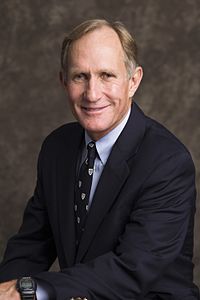Peter Agre
| Peter Agre | |
|---|---|

Peter Agre
|
|
| Born |
30 January 1949 Northfield, Minnesota, USA |
| Nationality | United States |
| Fields |
Medicine Chemistry Biochemistry |
| Alma mater |
Augsburg College (B.A., 1970) Johns Hopkins School of Medicine (M.D., 1974) University Hospitals Case Medical Center(1975-1978) North Carolina Memorial Hospital(1978-1981) |
| Known for | Aquaporins |
| Notable awards | Nobel Prize in Chemistry (2003) Bloomberg Distinguished Professorships (2014) |
Peter Agre /ˈɑːɡriː/ (born January 30, 1949) is an American physician and molecular biologist, Bloomberg Distinguished Professor at the Johns Hopkins Bloomberg School of Public Health and Johns Hopkins School of Medicine, and director of the Johns Hopkins Malaria Research Institute. In 2003, Agre and Roderick MacKinnon shared the 2003 Nobel Prize in Chemistry for “discoveries concerning channels in cell membranes.” Agre was recognized for his discovery of aquaporin water channels. Aquaporins are water-channel proteins that move water molecules through the cell membrane. In 2009, Agre was elected president of the American Association for the Advancement of Science (AAAS) and became active in science diplomacy.
Agre is the second of six children born in Northfield, Minnesota to parents of Norwegian and Swedish descent. Agre is a Lutheran. Fascinated by international travel after a high school camping trip through the Soviet Union, Agre was an inconsistent student until he developed an interest in science from his father who was a college chemistry professor.
...
Wikipedia
